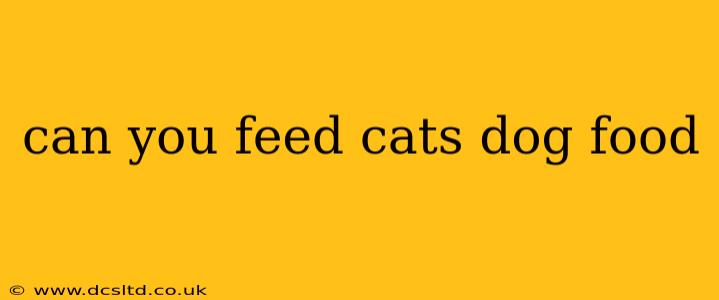Can You Feed Cats Dog Food? A Vet's Perspective on Cross-Species Diets
The short answer is: no, you shouldn't regularly feed cats dog food. While a small amount might not cause immediate harm, long-term reliance on dog food can lead to serious health problems for your feline friend. This is because cats and dogs have vastly different nutritional needs.
Let's delve deeper into why this is the case, addressing some common questions and concerns.
Why is dog food unsuitable for cats?
Cats are obligate carnivores, meaning their bodies are specifically designed to thrive on a diet rich in animal protein and fat. Their metabolism requires specific nutrients found in abundance in meat-based foods, which are often not adequately present in dog food.
Dog food, while formulated to meet canine nutritional requirements, often lacks the crucial nutrients cats need, including:
- Taurine: An amino acid essential for feline heart and vision health. Deficiency can lead to blindness and dilated cardiomyopathy (DCM), a serious heart condition.
- Arachidonic Acid: An omega-6 fatty acid important for skin and coat health.
- Vitamin A: Cats require pre-formed Vitamin A (retinol), unlike dogs who can synthesize it from beta-carotene. Dog food often contains less retinol or relies on beta-carotene conversion, which cats are less efficient at.
- Specific Amino Acid Profiles: Cats have different requirements for amino acids than dogs. Dog food might not supply these in the correct ratios.
Feeding your cat dog food regularly can result in nutritional deficiencies, leading to a range of health issues, impacting their lifespan and quality of life.
What happens if a cat eats dog food once or twice?
Occasional nibbling of dog food is unlikely to cause immediate harm. However, it shouldn't become a habit. Consider it like an occasional treat, not a meal replacement.
Is there any dog food that is safe for cats?
While some dog foods might contain ingredients that aren't inherently harmful to cats, they still lack the precise balance of nutrients required for feline health. It's best to avoid any substitution and stick to specifically formulated cat food.
My cat seems to prefer dog food over cat food. Why?
Cats can be picky eaters! This preference might stem from palatability – perhaps the dog food has a different texture or flavor profile that your cat finds more appealing. However, this doesn't negate the nutritional deficiencies that arise from consuming dog food as a primary food source. Consult your veterinarian to determine if there is a reason for your cat's preference (for instance, dental issues or food sensitivities) and explore ways to increase the cat's acceptance of its appropriate cat food.
What are the signs of nutritional deficiency in cats?
Signs of nutritional deficiencies can vary but may include:
- Weight loss or gain: Either extreme can indicate a nutritional imbalance.
- Dull coat: A lackluster, dry coat is a common sign.
- Poor appetite: A decrease in food consumption can be a subtle indicator.
- Lethargy: A decrease in energy levels.
- Vision problems: Blurred vision or blindness can signal taurine deficiency.
- Heart problems: DCM can manifest as breathlessness, fatigue, or coughing.
If you notice any of these symptoms, consult your veterinarian immediately.
Conclusion:
While accidental ingestion of a small amount of dog food won't typically harm your cat, it's crucial to remember that cat food is specially formulated to meet their unique nutritional needs. Regularly feeding cats dog food poses a significant risk to their health, potentially leading to serious and irreversible health problems. Always prioritize high-quality cat food designed to meet their specific dietary requirements. If you have concerns about your cat's diet or health, consult your veterinarian for personalized advice.
